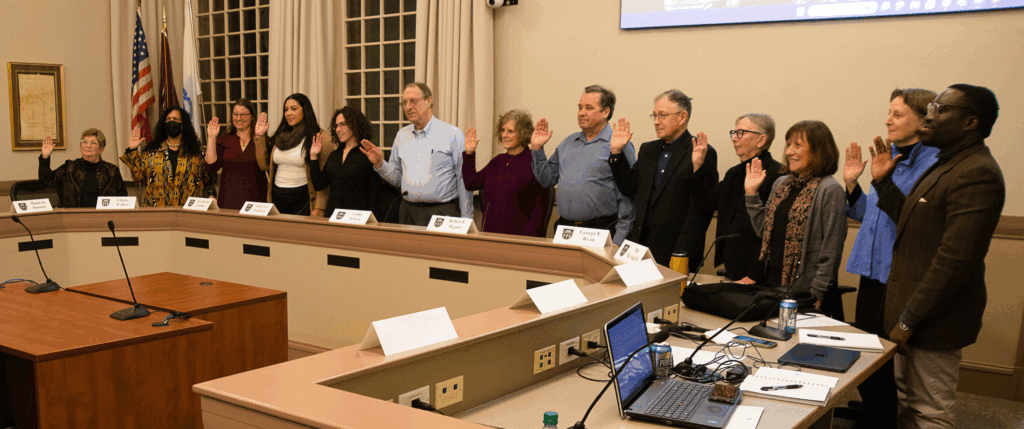Opinion: Amherst Needs Bold Leadership, Not Just Polite Caution

The current Amherst Town Council. Photo: amherstma.gov

This fall 2025, Amherst voters face a choice that will shape our town’s future for decades. The incumbents seeking re-election are presenting themselves as cautious protectors of neighborhoods. They promise accessibility, responsiveness, and constituent services — “a phone call away” leadership. These are not small things but Amherst’s biggest challenge today is that caution itself has become the problem.
We are losing families, falling behind on infrastructure, and clinging to outdated limits on housing and development. The result is a town increasingly shaped by external pressures rather than by choices rooted in the public good.
A Glimpse of What’s Possible
The Amherst Community Land Trust’s recent work on the Manning House at 61 Fearing Street shows what bold, community-led action can achieve. Neighbors have pledged more than $90,000; ACLT added $50,000; and the Manning family reduced the price by $150,000 to ensure the house stays an owner-occupied family home. That’s a $290,000 community commitment to preserving affordability and stability.
It is a remarkable success and a reminder that Amherst residents are willing to step up when given a chance. But it is also an exception to the rule. Most housing pressures in Amherst cannot be solved one house at a time.
The Larger Crisis
The data tell a stark story. Amherst is not just “a town with housing challenges.” It is a town in crisis:
- Housing costs are soaring. The median price of a single-family home jumped from $379,450 in 2019 to $600,000 in 2024 — an increase of over 58% in just five years.
- Rents are among the highest in the region. According to Zillow, the average rent in Amherst is $2,652 — about 11% higher than the national average.
- Affordability is collapsing. An estimated 43.9% of Amherst households are cost-burdened, spending more than 30% of their income on housing. Worse, 27.9% are severely cost-burdened, paying more than half their income just to keep a roof overhead.
- Housing stock is aging. More than 61.5% of Amherst’s homes were built before 1980, while only 14.2% have been built since 2000. Supply is stagnant even as demand surges.
- Families are leaving. Declining K-12 enrollment mirrors the steady drop in Amherst’s non-student population. Fewer families can afford to live here, hollowing out the long-term stability of our community.
These are not abstract figures. They show up as shuttered classrooms, seniors priced out of lifelong homes, and workers forced to commute long distances.
UMass and the Community
At the same time, UMass Amherst continues to expand, bringing undeniable cultural and economic vitality but also external pressure. When the university fails to fully house its growing student body, the burden falls on our neighborhoods, schools, and infrastructure. Rising rents, increased traffic, and strained services are the predictable result.
Too often, Amherst’s elected officials defer to process instead of leadership. Councilors remain silent when they should be demanding accountability and partnership from the university. Being “a phone call away” is not leadership when the big picture is going in the wrong direction.
What Amherst Needs Now
If Amherst is to thrive as a place for families, workers, and students, we need leadership that is willing to act boldly, not cautiously. That means:
- Reforming housing and zoning policies to allow for more density, mixed-income housing, accessory dwelling units, and multi-family development.
- Demanding accountability from UMass to align student housing growth with community capacity.
- Investing in infrastructure now — roads, transit, water, and broadband — to support both existing neighborhoods and new development.
- Expanding affordability tools such as community land trusts, subsidies, and deed restrictions to preserve housing for families.
- Upholding accountability and equity — no institution, public or private, should be beyond scrutiny when the town’s future is at stake.
The Choice Before Us
The debates over housing and growth in Amherst will be bruising. They will test our willingness to balance competing interests, and they will demand courage. But Amherst cannot afford more delay, deflection, or polite caution.
We stand at a crossroads. One path clings to outdated limits and hopes incremental fixes will be enough. The other path embraces bold leadership to confront the housing crisis, invest in infrastructure, and ensure Amherst remains a community for families, workers, and students alike.
The choice is not about being pro-growth or anti-growth. It is about whether Amherst will chart its own future or be shaped by forces beyond our control.
The choice is not about being pro-growth or anti-growth. It is about whether Amherst will chart its own future or be shaped by forces beyond our control.
This November, voters should demand more than constituent services and accessibility. We should demand leadership willing to make the hard choices. Because outcomes matter more than process — and Amherst’s future is too important to leave to caution.
Rizwana Khan is a resident of Amherst and a member of the town’s Human Rights Commission.
